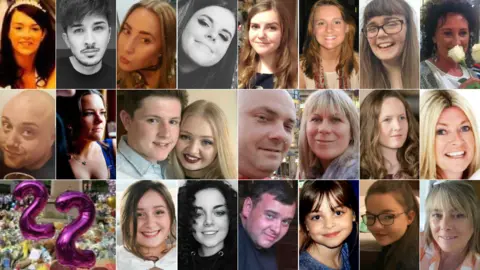Manchester Arena Inquiry: Police chief apologises for bomb response failings
 Manchester Arena Inquiry
Manchester Arena InquiryA police chief has apologised "unreservedly" for failings by his force in the emergency service response to the Manchester Arena bombing.
Deputy Chief Constable Ian Pilling said Greater Manchester Police's failure to establish effective inter-service communications was "unacceptable".
He was giving evidence at the public inquiry into the May 2017 attack which killed 22 people and injured hundreds.
Mr Pilling also praised the actions of the "brave" first responders.
"I would like to offer condolences from Greater Manchester Police (GMP) to all those who lost loved ones, who suffered injuries or hurt, or have been affected in any way by the tragic events at the Manchester Arena in 2017," he said.
"The response of so many of our staff, particularly first responders on the night, was exemplary, extraordinarily brave and quite humbling.
"However, I would like to acknowledge and apologise for failings by Greater Manchester Police, principally failing to carry out the basic functions of Jesip (Joint Emergency Services Interoperability Principles) in the early stages of the incident which impacted considerably on joint working."
Mr Pilling said a failure to notify other emergency services of the declaration of Operation Plato - a pre-planned response to a terror incident - and a failure to establish effective communications with other emergency services was "unacceptable and we apologise for this unreservedly".
"This is an apology not just to the victims and the families but also to all those affected by the attack including our emergency services colleagues," he said.
He said "significant work" had been undertaken to address many of the issues and added: "I would like to give absolute assurance our efforts to address these failings and any others which are identified will continue in the future."
 Family handouts
Family handoutsThe inquiry has heard the other blue light emergency services were unable to get through to the phone line of GMP's force duty officer (FDO), the initial commander of the incident.
Only three paramedics entered the City Room foyer - the scene of the blast at the end of an Ariana Grande concert - and the fire service attended more than two hours later.
Nick de la Poer QC, counsel to the inquiry, asked Mr Pilling: "From what you have seen of the evidence, was there sufficient resilience around the FDO on the night of 22 May?"
Mr Pilling replied: "I believe if certain things had been in place or if actions had been allocated in a certain way by the FDO then in terms of the number of people, the resilience around him, I believe yes there was."
The officer agreed there was insufficient effort put in up to the first 90 minutes after the explosion to ensure all emergency service partners met at a rendezvous point.
He accepted GMP must share a responsibility for that failure as it was the primary partner in the terrorist response and was expected to take the lead.
 Manchester Arena Inquiry
Manchester Arena InquiryA senior fire chief has also apologised for a "gross failure" in the Greater Manchester Fire and Rescue Service (GMFRS) response to the attack.
Retired assistant chief fire officer Geoff Harris, who was effectively second in command on the night, said the response was "completely unacceptable".
"It was far from adequate or effective," he told the inquiry.
"I extend my personal apologies for the failure of the fire and rescue service to respond adequately on that night.
"I don't think there's any one single point of failure. There are a number of issues that arose."
Mr Harris, who had more than 35 years of service before retiring, said some of his officers were "stuck in a loop" of trying to contact the police and displayed "some inertia" in overcoming the communication problems.
Paul Greaney QC, lead counsel to the inquiry, asked if the delay represented "not just a failure but a gross failure in response".
Mr Harris replied: "It does, sir."
He agreed that on the night there had been a failure of leadership within GMFRS and that it was "too risk averse" in its response.
A few hours after the bombing, Mr Harris met firefighters who were "fuming" about the failed response.
He recalled there was a "ring of firefighters around me" demanding answers which he was unable to give.
"Not only did we let down the people of Greater Manchester, we let those firefighters down," he said.
The inquiry continues.

Why not follow BBC North West on Facebook, Twitter and Instagram? You can also send story ideas to [email protected]
